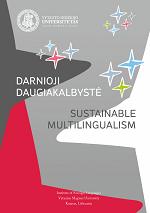IKT panaudojimas integruojant kalbos ir dalyko mokymą
Use of ICT in the Content and Language Integrating Teaching
Author(s): Daiva Pundziuvienė, Vilma Bijeikienė, Lina ZutkienėSubject(s): Foreign languages learning
Published by: Vytauto Didžiojo Universitetas
Keywords: information communication technologies (ICT); content and language integrated learning (CLIL); foreign language teaching; communicative competence; general education
Summary/Abstract: The present article generally focuses on the implementation of content and language integrated learning (CLIL ) methodology in Lithuanian schools of general education. Although CLIL has already enjoyed quite a long history of its application in various parts of the world and has to some extent been present in Lithuanian schools, the problematic aspects of its implementation in Lithuania are still pending to be resolved. Among a few shortcomings such as the lack of legal regulations or the absence of the ‘whole school policy’ approach, insufficient CLIL teachers’ competences can be placed at the top of the problem list. This is evidenced by the fact that the most popular type of CLIL in Lithuanian schools entails a subject teacher and a foreign language teacher working together in a CLIL class. To improve the situation the subject teachers need to perfect a number of competences including CLIL didactics, application of active methods, use of ICT, etc. to be prepared for a quality CLIL class. In light of this observation, the present study aims at analysing teachers’ attending a CLIL training course attitudes towards the application of ICT in various contexts ranging from the daily life routines to professional activities and to CLIL classes as a fertile area for ICT-based activities. It also aims at comparing the attitudes of teachers from general education schools with the ones obtained from university language teachers and students in earlier studies. It is an analytic quantitative study with 96 teachers participating as respondents. The study has revealed the teachers’ largely positive attitudes towards the application of ICT in CLIL classes indicating a number of advantages: the use of authentic subject-related resources in a foreign (target) language and the possibility to differentiate tasks and the teaching process as well as to motivate and organise students’ individual work. The application of ICT in CLIL classes is also highlighted by the teachers as an effective means of fostering students’ creativity through subject-related team projects such as webquests or by initiating cooperation with students from other schools and countries.
Journal: Darnioji daugiakalbystė
- Issue Year: 2012
- Issue No: 1
- Page Range: 110-122
- Page Count: 13
- Language: Lithuanian

